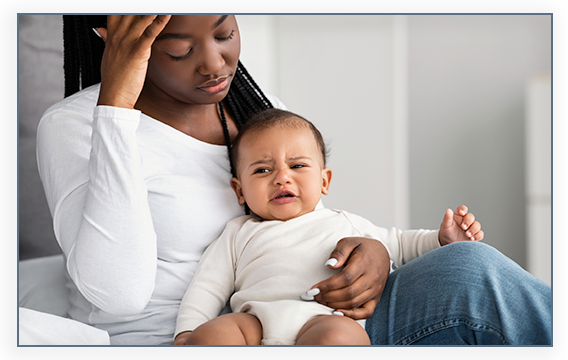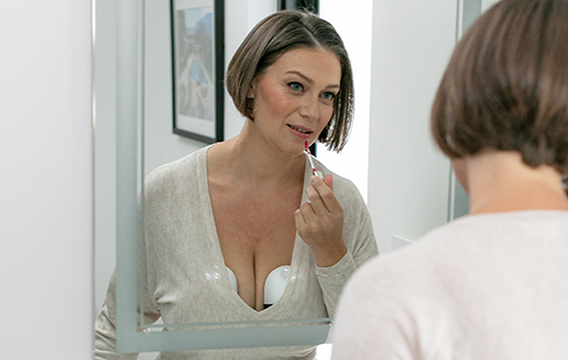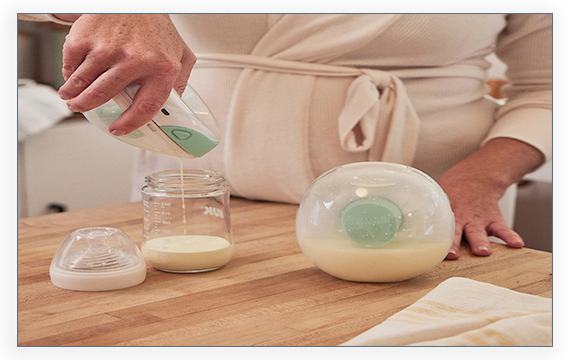What is the Baby Blues?
It is common for new moms to experience “baby blues.” The majority of women (70-80%) experience at least some symptoms after childbirth. Generally, they will start within the first couple of days after delivery, peak around one week, and taper off by the end of the second week postpartum. The symptoms may last for minutes or hours each day and should lessen and disappear after about 14 days.

It is important to discuss how you’re feeling with your healthcare provider after baby is born. As a new mom, there is a lot going on, but your health and wellbeing is a priority.
Symptoms include:
• Weepiness or crying for no apparent reason
• Impatience
• Irritability
• Restlessness
• Anxiety
• Fatigue
• Insomnia (even when the baby is sleeping)
• Sadness
• Mood changes
• Poor concentration
This form of mild depression is thought to be caused by the sudden change in hormones after delivery, combined with stress, isolation, sleep deprivation, and fatigue that can accompany bringing a new baby home. The baby blues are considered normal, but if your symptoms do not go away after a few weeks or worsen over time, you may be suffering from postpartum depression. There are many resources and treatment options available for those dealing with postpartum depression. It is vital to seek help and not ignore the symptoms!
In the beginning, postpartum depression can look like the normal baby blues. In fact, postpartum depression and the baby blues share many symptoms (mood swings, crying, sadness, insomnia, and irritability). The difference is that postpartum depression symptoms are more severe (such as suicidal thoughts or an inability to care for your newborn) and longer lasting.
Have more questions? Listen to our FREE podcast!
LISTEN NOWWhat can I do to help my symptoms?
• Talk with your healthcare provider about how you are feeling. Talk to friends, family members, your partner, and/or other people you trust about how you are feeling. There are also many support groups available.
• Keep a journal of all your thoughts and feelings.
• Ask for help. Get help with meals, other children, getting into a “routine,” or any help that you need. Do not expect to handle everything alone.
• Don’t expect perfection. Get rid of unrealistic expectations (a perfectly clean house, being able to do it all yourself). Give yourself time to heal, adjust to your new normal, and establish feeding and sleeping routines.
• Proper nutrition is key! Include protein, complex carbohydrates, Omega 3 fatty acids (DHA and EPA), vitamin D3, and folate in your daily diet.
If symptoms worsen or last longer than a few weeks, talk to your health care provider and seek help. If you suspect you are suffering from postpartum depression, the smartest and strongest step you can take for your family is to seek professional help.
The information contained here within is not intended to be a substitute for professional medical advice, diagnosis, or treatment. Always seek the advice of your physician or other qualified health provider with any questions you may have regarding a medical condition. Never disregard professional medical advice or delay in seeking it because of something you have read. If you think you may have a medical emergency, call your doctor, go to the emergency department, or call 911 immediately. Edwards Health Care Services (EHCS) does not recommend or endorse any specific tests, physicians, products, procedures, opinions, or other information that may be mentioned here within. Reliance on any information provided by EHCS, EHCS employees, contracted writers, or medical professionals presenting content for publication here within is solely at your own risk.
Sources:
• https://www.helpguide.org/articles/depression/postpartum-depression-and-the-baby-blues.htm
• https://americanpregnancy.org/first-year-of-life/baby-blues-or-postpartum-depression/
• https://americanpregnancy.org/first-year-of-life/baby-blues/
• https://americanpregnancy.org/first-year-of-life/preventing-the-baby-blues/
• https://americanpregnancy.org/pregnancy-health/omega-3-fatty-acids-faqs/
• https://ods.od.nih.gov/factsheets/Folate-HealthProfessional/
Tags: Baby blues, Health, Mom, Post-Partum, PPD, Self care, Wellness





